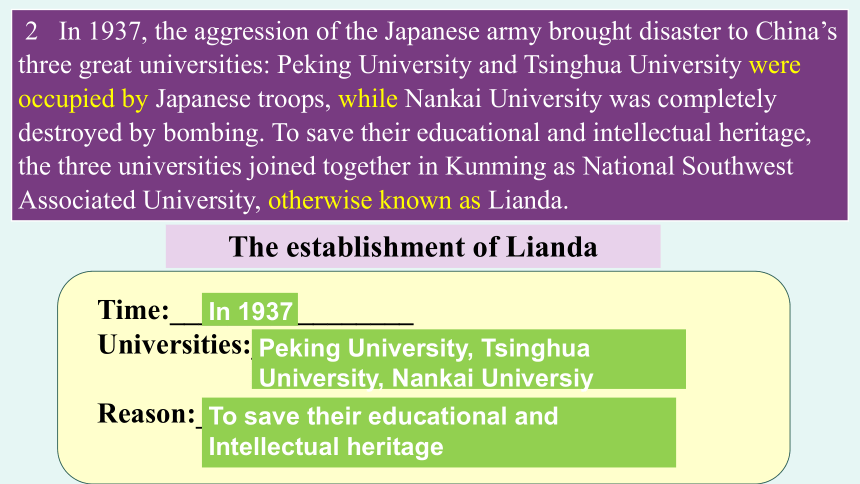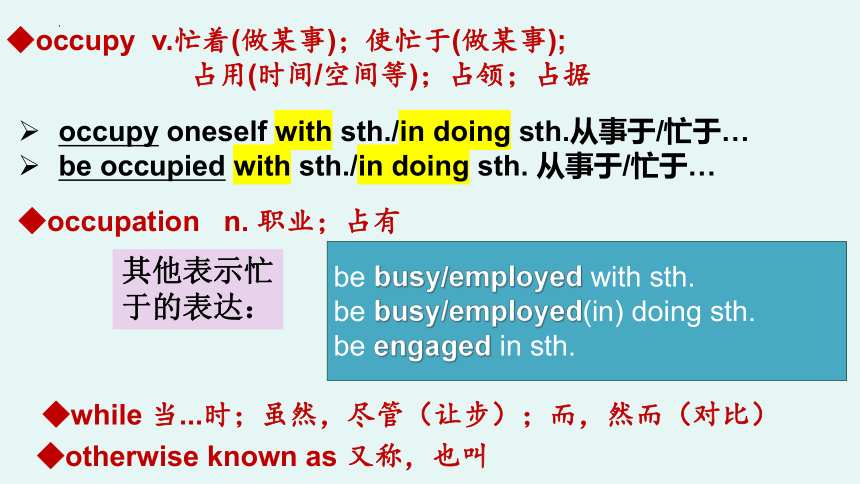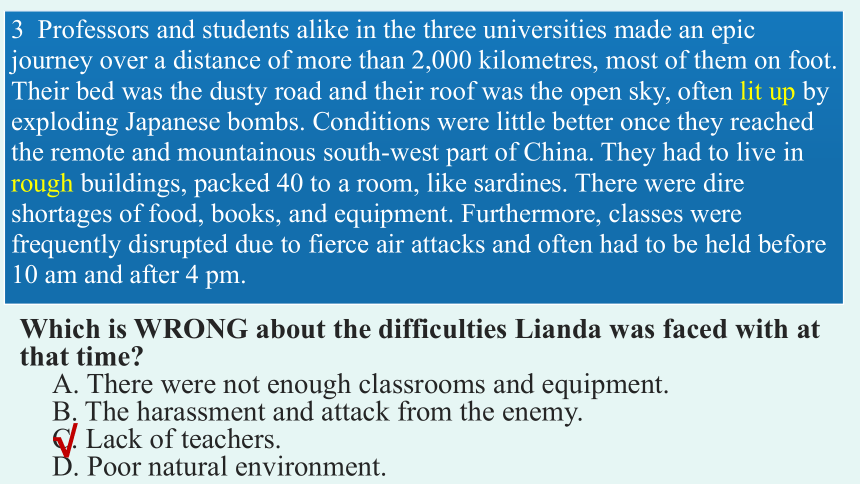外研版(2019)选择性必修第三册Unit 3 War and peace Developing ideas 课件(共13张PPT)
文档属性
| 名称 | 外研版(2019)选择性必修第三册Unit 3 War and peace Developing ideas 课件(共13张PPT) |

|
|
| 格式 | pptx | ||
| 文件大小 | 4.0MB | ||
| 资源类型 | 教案 | ||
| 版本资源 | 外研版(2019) | ||
| 科目 | 英语 | ||
| 更新时间 | 2024-04-06 00:00:00 | ||
图片预览






文档简介
(共13张PPT)
Unit 3 War and peace
Developing ideas
1 Throughout history, the great thinkers of the world have often rather romantically referred to their academic struggles as being like “war”. However, for most of them, the “war” has been purely symbolic. Real war is never romantic as it brings suffering and immense challenges.
refer to...as 称为,把...称作
refer to 提及;查阅;指的是;参考
academic struggle 学术之争
2 In 1937, the aggression of the Japanese army brought disaster to China’s three great universities: Peking University and Tsinghua University were occupied by Japanese troops, while Nankai University was completely destroyed by bombing. To save their educational and intellectual heritage, the three universities joined together in Kunming as National Southwest Associated University, otherwise known as Lianda.
The establishment of Lianda
Time:_________________
Universities:___________________________
Reason:___________________________
In 1937
Peking University, Tsinghua
University, Nankai Universiy
To save their educational and
Intellectual heritage
◆occupy v.忙着(做某事);使忙于(做某事);
占用(时间/空间等);占领;占据
occupy oneself with sth./in doing sth.从事于/忙于…
be occupied with sth./in doing sth. 从事于/忙于…
◆occupation n. 职业;占有
be busy/employed with sth.
be busy/employed(in) doing sth.
be engaged in sth.
◆while 当...时;虽然,尽管(让步);而,然而(对比)
◆otherwise known as 又称,也叫
其他表示忙于的表达:
Practice
____________ (occupy) in making preparations for the coming exam, she couldn't afford any more time for the party.
The boy, ____________ (occupy) himself with his schoolwork every day, felt rather tired but full.
He ____________ (occupy) in motivating the teenagers to understand their parents.
She is occupied ________ daily routine every day.
I have been wondering why you are interested in this ______________ (occupy).
Occupied
occupying
is occupied
with
occupation
3 Professors and students alike in the three universities made an epic journey over a distance of more than 2,000 kilometres, most of them on foot. Their bed was the dusty road and their roof was the open sky, often lit up by exploding Japanese bombs. Conditions were little better once they reached the remote and mountainous south-west part of China. They had to live in rough buildings, packed 40 to a room, like sardines. There were dire shortages of food, books, and equipment. Furthermore, classes were frequently disrupted due to fierce air attacks and often had to be held before 10 am and after 4 pm.
Which is WRONG about the difficulties Lianda was faced with at that time
A. There were not enough classrooms and equipment.
B. The harassment and attack from the enemy.
C. Lack of teachers.
D. Poor natural environment.
√
rough adj.简单的;粗糙的;粗略的;猛烈的;崎岖的; 高低不平的;艰难的
I can only give you a rough number of how many guests will attend the party.
It was a rough time for me because I had just lost my job and had no money with me.
The driver had to drive very slowly and carefully because the road was very rough and narrow.
粗略的,大致的
艰难的
崎岖的,高低不平的
light up 照亮,点亮; (使)流露出喜悦;开始抽烟
4 However, despite the immense hardships and the daunting challenges, it was right in this place, over a period of eight long years, that the nation’s intellectual heritage was not only guarded but fortified by the passion and belief of the worthy academics of Lianda. It is no wonder that many, if not most, of China’s leading scholars and scientists emerged at Lianda, including the two Nobel Prize-winning physicists, Yang Zhenning and Li Zhengdao. “Lianda laid the foundation for every achievement I have made,” Yang recalled. He still remembers learning in a temporary classroom that had no glass in the windows. “On windy days, we had to hold down the paper on the desk, which would otherwise be blown away,” he said.
1.What made the nations intellectual heritage not only Guarded
but also fortified?
2.What does Yang Zhenning think of the days when he was learning in
Lianda
A. Tough but worthy. B. Interesting and relaxing.
C. Hard and disappointing. D. Enjoyable and priceless.
√
4 However, despite the immense hardships and the daunting challenges, it was right in this place, over a period of eight long years, that the nation’s intellectual heritage was not only guarded but fortified by the passion and belief of the worthy academics of Lianda. It is no wonder that many, if not most, of China’s leading scholars and scientists emerged at Lianda, including the two Nobel Prize-winning physicists, Yang Zhenning and Li Zhengdao. “Lianda laid the foundation for every achievement I have made,” Yang recalled. He still remembers learning in a temporary classroom that had no glass in the windows. “On windy days, we had to hold down the paper on the desk, which would otherwise be blown away,” he said.
emerge v.出现,兴起; 摆脱; 暴露; 露头
emerge from (从水中等)出来,现出,露出
emerging adj.新兴的
5 With the country at war, students at Lianda were not going to shirk their duty. Driven by a sense of commitment, a great many joined the army to resist the Japanese invaders and defend the honour of the nation. In fact, Lianda provided the largest number of student-soldiers from any campus in China. Of the thousands of college students from all over China who served as interpreters, one tenth were from Lianda, including the well-known translators Zha Liangzheng and Xu Yuanchong. Zha later depicted the contributions of his peers in a poem: Softly, on the hillside forgotten by all,A misty rain falls in a gentle breeze;There is no trace of the footprints of history;Where brave souls once stood, breathing new life into the trees.
√
What did students of Lianda do when our country was at war
A. They tried to study at school and escape from war.
B. Students of Lianda refused to participate in the battle.
C. They wrote poems to show the contributions of the soldiers.
D. A large number of students took up arms and defended our country.
5 With the country at war, students at Lianda were not going to shirk their duty. Driven by a sense of commitment, a great many joined the army to resist the Japanese invaders and defend the honour of the nation. In fact, Lianda provided the largest number of student-soldiers from any campus in China. Of the thousands of college students from all over China who served as interpreters, one tenth were from Lianda, including the well-known translators Zha Liangzheng and Xu Yuanchong. Zha later depicted the contributions of his peers in a poem: Softly, on the hillside forgotten by all,A misty rain falls in a gentle breeze;There is no trace of the footprints of history;Where brave souls once stood, breathing new life into the trees.
◆serve as 充当;担任;起作用
one tenth 十分之一
6 A product of the war, Lianda is now physically gone. But it has become the crowning glory of China’s modern universities, not only because of its prominent professors and talented students, but also because of the school’s strong spirit of perseverance and dedication. In 2017, representatives from Peking University, Tsinghua University, Nankai University and Yunnan Normal University gathered to commemorate the 80th anniversary of its founding.
represent v.代表,表示;表现;描绘;象征
represent ... as/to be ... 宣称...为...,把...描绘成...
represent oneself/sb. as/to be 自称是...
be representative of 代表...的
◆crowning 最高的,至高无上的
representative n. 代表 adj. 典型的
7 More than eighty years on, the priceless contribution of Lianda still needs to be reaffirmed. It has become part of the collective memory of the Chinese nation, with its spirit as the blueprint for all universities in China in the modern era.
Unit 3 War and peace
Developing ideas
1 Throughout history, the great thinkers of the world have often rather romantically referred to their academic struggles as being like “war”. However, for most of them, the “war” has been purely symbolic. Real war is never romantic as it brings suffering and immense challenges.
refer to...as 称为,把...称作
refer to 提及;查阅;指的是;参考
academic struggle 学术之争
2 In 1937, the aggression of the Japanese army brought disaster to China’s three great universities: Peking University and Tsinghua University were occupied by Japanese troops, while Nankai University was completely destroyed by bombing. To save their educational and intellectual heritage, the three universities joined together in Kunming as National Southwest Associated University, otherwise known as Lianda.
The establishment of Lianda
Time:_________________
Universities:___________________________
Reason:___________________________
In 1937
Peking University, Tsinghua
University, Nankai Universiy
To save their educational and
Intellectual heritage
◆occupy v.忙着(做某事);使忙于(做某事);
占用(时间/空间等);占领;占据
occupy oneself with sth./in doing sth.从事于/忙于…
be occupied with sth./in doing sth. 从事于/忙于…
◆occupation n. 职业;占有
be busy/employed with sth.
be busy/employed(in) doing sth.
be engaged in sth.
◆while 当...时;虽然,尽管(让步);而,然而(对比)
◆otherwise known as 又称,也叫
其他表示忙于的表达:
Practice
____________ (occupy) in making preparations for the coming exam, she couldn't afford any more time for the party.
The boy, ____________ (occupy) himself with his schoolwork every day, felt rather tired but full.
He ____________ (occupy) in motivating the teenagers to understand their parents.
She is occupied ________ daily routine every day.
I have been wondering why you are interested in this ______________ (occupy).
Occupied
occupying
is occupied
with
occupation
3 Professors and students alike in the three universities made an epic journey over a distance of more than 2,000 kilometres, most of them on foot. Their bed was the dusty road and their roof was the open sky, often lit up by exploding Japanese bombs. Conditions were little better once they reached the remote and mountainous south-west part of China. They had to live in rough buildings, packed 40 to a room, like sardines. There were dire shortages of food, books, and equipment. Furthermore, classes were frequently disrupted due to fierce air attacks and often had to be held before 10 am and after 4 pm.
Which is WRONG about the difficulties Lianda was faced with at that time
A. There were not enough classrooms and equipment.
B. The harassment and attack from the enemy.
C. Lack of teachers.
D. Poor natural environment.
√
rough adj.简单的;粗糙的;粗略的;猛烈的;崎岖的; 高低不平的;艰难的
I can only give you a rough number of how many guests will attend the party.
It was a rough time for me because I had just lost my job and had no money with me.
The driver had to drive very slowly and carefully because the road was very rough and narrow.
粗略的,大致的
艰难的
崎岖的,高低不平的
light up 照亮,点亮; (使)流露出喜悦;开始抽烟
4 However, despite the immense hardships and the daunting challenges, it was right in this place, over a period of eight long years, that the nation’s intellectual heritage was not only guarded but fortified by the passion and belief of the worthy academics of Lianda. It is no wonder that many, if not most, of China’s leading scholars and scientists emerged at Lianda, including the two Nobel Prize-winning physicists, Yang Zhenning and Li Zhengdao. “Lianda laid the foundation for every achievement I have made,” Yang recalled. He still remembers learning in a temporary classroom that had no glass in the windows. “On windy days, we had to hold down the paper on the desk, which would otherwise be blown away,” he said.
1.What made the nations intellectual heritage not only Guarded
but also fortified?
2.What does Yang Zhenning think of the days when he was learning in
Lianda
A. Tough but worthy. B. Interesting and relaxing.
C. Hard and disappointing. D. Enjoyable and priceless.
√
4 However, despite the immense hardships and the daunting challenges, it was right in this place, over a period of eight long years, that the nation’s intellectual heritage was not only guarded but fortified by the passion and belief of the worthy academics of Lianda. It is no wonder that many, if not most, of China’s leading scholars and scientists emerged at Lianda, including the two Nobel Prize-winning physicists, Yang Zhenning and Li Zhengdao. “Lianda laid the foundation for every achievement I have made,” Yang recalled. He still remembers learning in a temporary classroom that had no glass in the windows. “On windy days, we had to hold down the paper on the desk, which would otherwise be blown away,” he said.
emerge v.出现,兴起; 摆脱; 暴露; 露头
emerge from (从水中等)出来,现出,露出
emerging adj.新兴的
5 With the country at war, students at Lianda were not going to shirk their duty. Driven by a sense of commitment, a great many joined the army to resist the Japanese invaders and defend the honour of the nation. In fact, Lianda provided the largest number of student-soldiers from any campus in China. Of the thousands of college students from all over China who served as interpreters, one tenth were from Lianda, including the well-known translators Zha Liangzheng and Xu Yuanchong. Zha later depicted the contributions of his peers in a poem: Softly, on the hillside forgotten by all,A misty rain falls in a gentle breeze;There is no trace of the footprints of history;Where brave souls once stood, breathing new life into the trees.
√
What did students of Lianda do when our country was at war
A. They tried to study at school and escape from war.
B. Students of Lianda refused to participate in the battle.
C. They wrote poems to show the contributions of the soldiers.
D. A large number of students took up arms and defended our country.
5 With the country at war, students at Lianda were not going to shirk their duty. Driven by a sense of commitment, a great many joined the army to resist the Japanese invaders and defend the honour of the nation. In fact, Lianda provided the largest number of student-soldiers from any campus in China. Of the thousands of college students from all over China who served as interpreters, one tenth were from Lianda, including the well-known translators Zha Liangzheng and Xu Yuanchong. Zha later depicted the contributions of his peers in a poem: Softly, on the hillside forgotten by all,A misty rain falls in a gentle breeze;There is no trace of the footprints of history;Where brave souls once stood, breathing new life into the trees.
◆serve as 充当;担任;起作用
one tenth 十分之一
6 A product of the war, Lianda is now physically gone. But it has become the crowning glory of China’s modern universities, not only because of its prominent professors and talented students, but also because of the school’s strong spirit of perseverance and dedication. In 2017, representatives from Peking University, Tsinghua University, Nankai University and Yunnan Normal University gathered to commemorate the 80th anniversary of its founding.
represent v.代表,表示;表现;描绘;象征
represent ... as/to be ... 宣称...为...,把...描绘成...
represent oneself/sb. as/to be 自称是...
be representative of 代表...的
◆crowning 最高的,至高无上的
representative n. 代表 adj. 典型的
7 More than eighty years on, the priceless contribution of Lianda still needs to be reaffirmed. It has become part of the collective memory of the Chinese nation, with its spirit as the blueprint for all universities in China in the modern era.
